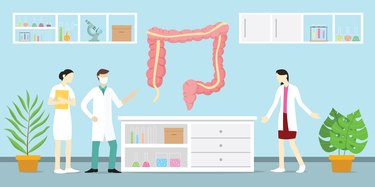
Colonoscopies are most frequently performed in order to screen for colon cancer and harmful intestinal polyps, but they're also done to find reasons for unexplained symptoms such as rectal bleeding, according to the American Cancer Society.
Other symptoms that a colonoscopy might investigate include persistent diarrhea and constipation, iron-deficiency anemia, abdominal pain and abnormal radiology results, says Elena Ivanina, DO, a gastroenterologist with Lenox Hill Hospital in New York City.
Video of the Day
Video of the Day
Here are some of the health conditions that a colonoscopy can help reveal.
Intestinal Polyps and Tumors
Doctors don't just detect polyps during a colonoscopy procedure — they also remove them. The bigger a polyp is, the more likely it is to pose a problem. Large polyps may require separate surgery.
Intestinal polyps and colorectal cancer exist on a spectrum. The vast majority of polyps — which are outgrowths of normal colonic tissue — are harmless and don't develop into anything dangerous. But a small proportion of them can turn into malignant tumors if they're not removed, according to Harvard Health Publishing.
"Polyps can be either neoplastic, which is precancerous or cancerous, or not neoplastic, which basically has no cancer potential," says Dr. Ivanina.
Polyps that have the potential to become cancer are called adenomas, according to the American Society for Gastrointestinal Endoscopy. "About 5 percent of all adenomas progress to cancer," says Dr. Ivanina, "but it takes about 7 to 10 years." That's why it's so important to find and remove polyps as soon as possible.
Internal Hemorrhoids
Hemorrhoids are collections of blood vessels around your anus and in your rectum, according to the National Institute for Diabetes and Digestive and Kidney Diseases. If they swell and become inflamed, they can cause pain, bleeding and itching.
A doctor will be able to see external hemorrhoids just by looking at the area around your anus. But internal hemorrhoids, which can develop in your rectum, require a deeper exam for detection. "In general, you do need a colonoscopy to see them," says Dr. Ivanina.
Some hemorrhoids don't cause any symptoms, and mild symptoms can usually be treated with over-the-counter creams and preparations. More troublesome hemorrhoids, however, may need to be removed by a doctor, according to the Mayo Clinic.
Diverticulosis and Diverticulitis
A condition called diverticulosis is another common reason for blood in the stool. The condition itself is very common and typically occurs as people age. "It's just a weakening of the wall of the colon," Dr. Ivanina says. "Instead of being a normal tube structure, [the colon] now has little pouches where things like poop can get stuck and cause infections." If the pouches do get infected, it's called diverticulitis.
About 15 percent of people who have diverticulosis end up with bleeding, says Dr. Ivanina. But there are things you can do to prevent the pouches from getting inflamed, such as adding fiber to your diet or taking certain medications. If diverticulitis develops, it can sometimes be treated with antibiotics.
Intestinal Inflammation and Ulceration
Several different medical conditions can cause inflammation of the colon. Inflammation is easily detected during a colonoscopy, but doctors may order additional testing — specifically, a biopsy — to pinpoint the cause.
"On a colonoscopy, [an inflamed colon or rectum] looks red and granular," says Dr. Ivanina. The colonoscope itself, however, can irritate the area even more, so colonoscopies must be performed very carefully in these kinds of situations.
Inflammation of the colon is often a sign of inflammatory bowel disease, or IBD. The two main types of IBD are ulcerative colitis, which involves chronic inflammation and ulcers — aka sores — in your colon and rectum, and Crohn's disease, which can cause inflammation in the colon, small intestine and other parts of your digestive tract. Having IBD can increase your risk of colon cancer, according to the Crohn's & Colitis Foundation.
Intestinal inflammation can also be symptomatic of an ulcer, which can be caused by IBD, an infection, decreased blood flow to the colon (called ischemia) or medications such as non-steroidal anti-inflammatory drugs, says Dr. Ivanina.
Read more: How to Recover After a Colonoscopy
A Healthy Colon
Post-colonoscopy, most patients get an all-clear from their doctor. (This is known as a "negative result" in medical speak.) A 2016 study published in_ JAMA Internal Medicine_ looked at more than 31,000 people who received colonoscopies and found that only 0.5 percent had cancer, while another 30.7 percent had adenomas (of those, a third were high risk). The rest received a negative result.
Importantly, the researchers noted that the detection rate was high — which means that the colonoscopy procedure is an effective tool for the identification and treatment of potentially dangerous colon polyps.
- American Cancer Society: “Colonoscopy”
- National Institute of Diabetes and Digestive and Kidney Diseases: “Colonoscopy”
- Harvard Health Publishing: “Understanding the Results of Your Colonoscopy”
- American Society for Gastrointestinal Endoscopy: “Understanding Polyps and Their Treatment”
- National Institute of Diabetes and Digestive and Kidney Diseases: “Hemorrhoids”
- Mayo Clinic: “Hemorrhoids”
- Crohn’s & Colitis Foundation: “The Risk of Colorectal Cancer in Crohn’s Disease and Ulcerative Colitis Patients”
- JAMA Internal Medicine: “Population-Based Colonoscopy Screening for Colorectal Cancer: A Randomized Clinical Trial”
Is this an emergency? If you are experiencing serious medical symptoms, please see the National Library of Medicine’s list of signs you need emergency medical attention or call 911.